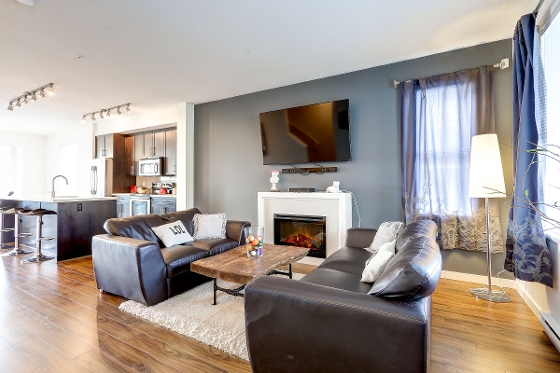Executive home with an unusual floorplan and lush garden!
MLS#: R2102181
Please click on the picture for Virtual Tour!
Executive home with an unusual floorplan and lush garden!
MLS#: R2102181
Please click on the picture for Virtual Tour!

 Image: Kenneth Chan / Daily Hive
Image: Kenneth Chan / Daily HiveA total of $740 million in public transit improvements will be made in Metro Vancouver over the next three years, and pre-construction work for the highly sought-after projects to extend SkyTrain’s Millennium Line under West Broadway in Vancouver and build 27 kilometres of street-level light rail transit (LRT) in Surrey will begin within the next 18 months.
Prime Minister Justin Trudeau and Premier Christy Clark were at SkyTrain’s Operations and Maintenance Centre in Burnaby this morning to announce that both senior governments are providing $616 million in combined funding, with the federal government reaffirming its $370 million commitment announced during the first budget earlier this year. The provincial government is offering $246 million, which was announced in late-May, and another $125 million from TransLink will fill in the gap for the first phase of transit improvements.
This follows the 50% federal, 33% provincial, and 17% TransLink and municipal level formula of funding transit in the region.
Trudeau noted that the federal government will not dictate how projects are to be built and which projects are to receive funding, unlike his predecessor who required funding requests to undergo a federal-level business case analysis. However, projects like Surrey LRT could still be required to undergo a business case study by the provincial government in exchange for provincial funding, on top of a dual comparison business case by TransLink for both light rail and SkyTrain technologies.
“I want to emphasis with this federal investment, provinces and municipalities will be able to invest in projects that make the most sense for their communities,” said Trudeau during the press conference. “We know that they know what needs to be done better than anyone else. We respect that expertise.”
Approximately one-third of the funding for the first phase will go towards the procurement of new and additional rolling stock for the transit fleet. This includes: $112 million for 28 new Mark III cars (seven four-car trains) for the Expo, Millennium, and Evergreen lines to increase capacity by 12%; $88 million for 22 new cars (eleven two-car trains) for the Canada Line to increase capacity by 55% and reduce crowding; $21 million for five new West Coast Express cars; and a third SeaBus ferry vessel to increase service frequency from every 15 minutes to 10 minutes during peak hours.
About $112 million will be used to perform upgrades on the Expo and Canada lines to ensure the stations can handle the increase in passenger circulation, within platform area and station concourse, from the train fleet expansion.
For the region’s two major rapid transit extension projects, $43 million has been set aside for planning, design, and procurement activities of the underground SkyTrain extension on Broadway and Surrey LRT. Another $114 million is allocated for pre-construction for both projects, including road improvements preparing for LRT construction, improving SkyTrain’s power systems, and expanding the storage capacity at Edmonds Operations and Maintenance Centre.
The budget also provides $196 million for the maintenance of existing infrastructure, including $92 million for upgrading bus maintenance facilities and SkyTrain’s communications, guideway intrusion, and security monitoring systems.
The federal government says it intends to fulfill its campaign promise of providing $20 billion over the next 10 years for transit funding across Canada. It has already committed $3.4 billion for shovel-ready projects over the next three years, and the remaining for new major projects will come from future federal budgets.
“Remember, this is just phase one,” said Trudeau. “We are now working with provinces and municipalities to develop the second phase of transit investments to fund major new transit projects that Canadian communities need.”
Over the coming decade, Metro Vancouver could receive as much as $3.75 billion from the federal government, covering half of the Mayors’ Council $7.5 billion plan. But this is dependent on the provincial government confirming its 33% share, approximately $2.48 billion, and TransLink and municipal governments finding new revenues to ensure they can fulfill their 17% share.
In late-May, the Mayors’ Council proposed a hike on property taxes and transit fares, the implementation of regional road tolls, sale of surplus TransLink property, development fees, and the diversion of the region’s gas taxes to help raise the needed revenue. However, these new revenues for TransLink are also subject to provincial government approval, although not necessarily another transit plebiscite.
“We don’t expect to have another referendum on this,” said Vancouver Mayor Gregor Robertson. “The federal funding is much more significant than what it was a few years ago, and it has meant that it means we have much less dollars to confirm in the region. We need to confirm those with the province though, which is an important step to ensure the entire 10-year plan committed.
“The Mayors don’t want this [transit expansion] to be piecemeal. We need the province to commit with the federal government as well.”
Home Owner Grant - Don't Forget to Apply!!!

It’s that time of year again when property taxes are coming due. Did you know that the average homeowner saves about $600.00 with the home owners grant?
On the bottom of your property taxes you will notice a section called “Home Owner Grant Application”. Make sure you take the time to fill that out!
Below is a list of frequently asked questions regarding property taxes.
When are my property taxes due?
Are my property taxes included in my mortgage payment?
TOTALLY RENOVATED HOUSE
in excellent neighborhood and cul de sac street.

Huge sunny deck great for BBQ, fenced in back yard w/ beautiful fruit trees (apple, plum & cherry), loads of curb appeal.
Amazing gourmet kitchen, shaker cabinets, large prepping island, handmade backsplash tiling from Turkey & stainless steel appliances.
Modern paint, large windows with lots of natural light throughout.
New hardwood flooring throughout, the main floor has been newly updated with beautiful hardwood in hallway, living room & dining room.
New base boards, crown moulding, casing on doors and designer paint colors.
Full self contained suite w/laundry for mortgage helper!
5 yr old roof, newer furnace in 2004 & water heater in 2005!
Nothing to do but move in!!!
Open House Saturday & Sunday 2-4pm
Congratulations to the new happy owners of #5 - 11176 Gilker Hill Rd. in Maple Ridge!

#302 - 2405 Kamloops St. Vancouver
MLS# R2055709 $400,000
Come by on Sunday 2 - 4 pm!!

See you at the Tri-City Home Expo April 1,2 & 3 Poirier Rec Center in Coquitlam Booth #99
Danielle Jones & Jessica Prasad ReMax Sabre Realty
Check out our funny video!
New Listing coming soon! 1-22751 Haney BP Maple Ridge Open House March 12 & 13th 11:30 – 1:30pm

Features…
2208 sqft
View of Fraser River
4 bedroom + den
3 bathroom
Granite counters & S/S appliances
Espresso flooring
Double garage parking
Close to transit, shopping, restaurants
Welcome River's Edge! This 2200 sqft end unit home Features 3 bedroom, 4 bathrooms and views of the Fraser River. Enjoy the upgraded slate floors, faux rock feature wall as you enter. Slate floors and backsplash continue in the designer kitchen, upgrades are high end cabinetry, stainless steel appliances, real sillstone counters tops. The living room and dining room feature real engineered hardwood floors, designer paint and decor, cozy gas fireplace, Upstairs is a large master bedroom with updated custom vanity and basin sink in ensuite bathroom. 2 more generous bedrooms & renovated main bathroom. Fully finished basement with rec room, guest bedroom & 3 piece bathroom (RI for shower). Entertain on 2 large balconies off greenbelt and double garage parking. Centrally located, just 1 km to the West Coast Express, Haney Wharf, Casino, an Alehouse and so much more.

When considering what their home is worth these days, Metro Vancouver homeowners would be wise to heed that old expression about there being three kinds of lies: lies, damned lies and statistics. The world of real-estate statistics, especially in these volatile times, can be a complex and confusing area where amateurs should tread with care. Cameron Muir, chief economist for the B.C. Real Estate Association, notes there are three main types of real-estate evaluations used by the industry: the average price, the median price and the House Price Index.
The average-price method has its shortcomings because a few higher-valued home sales in an area tend to skew prices upwards. “For example, in Metro Vancouver, say the average price is $850,000,” he says. “The fact is, 70 per cent of homes will actually be sold for below that number.” A median price reflects a point where 50 per cent of homes sell at a higher price and 50 per cent below it — again, it’s of limited value, Muir says.
The most useful gauge for consumers buying or selling is the House Price Index, which tries to measure price trends of a “typical home” in a specific neighbourhood with a certain number of bedrooms and other attributes. But any one of these evaluations doesn’t do the job by itself, he says. “There is no perfect pricing measure, making it very hard for you to get a representative number for your home.”
Jon Bennest of the Vancouver research firm Urban Analytics says he notices how real-estate statistics are misapplied in articles considering the affordability of Vancouver real estate. Commentators often calculate the costs of servicing a mortgage as a measure, “but people have the equity to buy these homes based on their wealth and net worth rather than on what they earn.” It’s not just prices that consumers should approach with caution. Developer Michael Geller notes that there is a world of damned statistics surrounding square footage. With no one standard of measurement, square footage can vary significantly from condo development to development.
Depending on whether you measure from the interior mid-point or the absolute exterior of a wall, you end up with a total plus or minus 50 to 80 square feet. At current construction costs, that can mean a difference of $50,000 to $80,000 on the purchase price of a 1,000-square-foot home. A developer is obliged only to disclose the measurement method used, a question buyers should always ask before signing on the dotted line, he said.
All of this, the experts say, makes it important for those in the market to consult with a local realtor before buying or selling a home.
REAL ESTATE
BY MICHAEL BERNARD, WestCoast Hom & Design Magazine